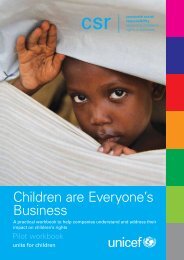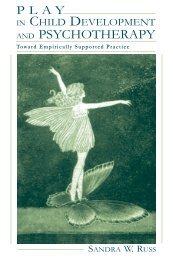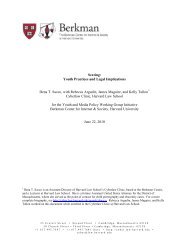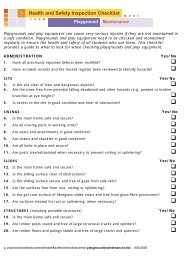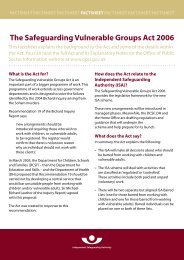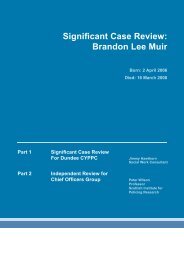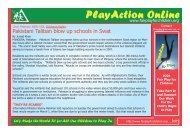Vetting and disclosures - Fair Play For Children
Vetting and disclosures - Fair Play For Children
Vetting and disclosures - Fair Play For Children
Create successful ePaper yourself
Turn your PDF publications into a flip-book with our unique Google optimized e-Paper software.
9. Government must communicate with the public about the scheme, <strong>and</strong> do so in a way which<br />
builds public support for the proportionate use of checking.<br />
10. Government must support <strong>and</strong> encourage employers to develop safe practice, <strong>and</strong> incorporate<br />
messages about safeguarding in any communications relating to the revised vetting <strong>and</strong> barring<br />
scheme.<br />
Introduction<br />
1. The UK Government is changing the way in which the vetting <strong>and</strong> barring <strong>and</strong> criminal records<br />
disclosure systems work in Engl<strong>and</strong>, Wales <strong>and</strong> Northern Irel<strong>and</strong>. There has been a lot of debate<br />
about, <strong>and</strong> scrutiny of, the changes to the scheme which are contained within the Protection of<br />
Freedoms Bill currently making its way through Parliament.<br />
2. However the proof of the pudding is in the eating. Barring <strong>and</strong> checking will only help to keep<br />
children safe if employers <strong>and</strong> voluntary organisations use the systems properly: seeking out<br />
information on individuals who work with children <strong>and</strong> using this information to make sensible<br />
decisions about recruitment <strong>and</strong> management of staff.<br />
3. With this in mind, the Child Protection All Party Parliamentary Group held an enquiry in June<br />
<strong>and</strong> July 2011 into the implementation of the changes to vetting <strong>and</strong> <strong>disclosures</strong>. We heard<br />
evidence from representatives of organisations that employ staff or volunteers to work with<br />
children, met Lynne Featherstone MP the Minister responsible for the scheme, <strong>and</strong> conducted<br />
two online surveys to seek further views. This report draws out the key messages from the<br />
evidence we received, <strong>and</strong> sets out recommendations for Government.<br />
4. We hope that our work will play a valuable role in challenging <strong>and</strong> assisting Government to<br />
consider how best to ensure that employers <strong>and</strong> voluntary organisations use the new vetting <strong>and</strong><br />
disclosure scheme effectively, <strong>and</strong> take other necessary steps to keep children safe.<br />
Part 1: The design of the scheme<br />
5. This enquiry set out to investigate the implementation of the new vetting <strong>and</strong> disclosure scheme,<br />
not their design. However, unsurprisingly, we did end up discussing some of the design of the<br />
scheme, <strong>and</strong> feel it is appropriate to reflect the key points of those discussions in this report.<br />
The changes to the vetting <strong>and</strong> barring scheme<br />
The <strong>Vetting</strong> <strong>and</strong> Barring Scheme aims to prevent unsuitable people from undertaking certain paid or<br />
volunteer work with children or vulnerable adults (‘regulated activity’). It does this by vetting all<br />
those who wish to do such work <strong>and</strong> barring those who have committed a certain offence or where<br />
the barring authority believes they pose a risk of harm to vulnerable people.<br />
Everyone working in regulated activity must be CRB checked, <strong>and</strong> barred individuals will be<br />
prohibited from working in these positions (although they can work with children in positions<br />
outside regulated activity).<br />
The Protection of Freedoms Bill reduces the scope of ‘regulated activity relating to children’ which<br />
specifies what work a person is barred from doing if he or she is included in the children’s barred list.<br />
Regulated activity still covers much paid <strong>and</strong> unpaid work that involves close interaction with<br />
children, or work in specified places such as schools where individuals have the opportunity for<br />
contact with children. However, as a result of the Government’s changes, regulated activity relating<br />
to children no longer covers the following positions:<br />
• Supervision, teaching, training, instruction or care of children by a person who is subject to<br />
regular day to day supervision in their work, UNLESS the activity involves certain types of<br />
personal care or takes place in a specified place such as a school or children’s home.<br />
2


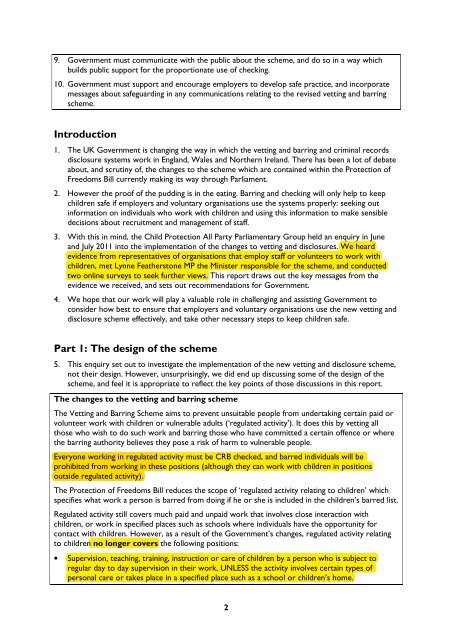

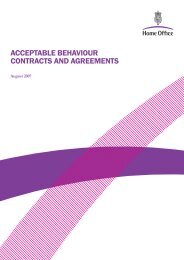
![The Childcare Act 2006 - Notes [Website] - Fair Play For Children](https://img.yumpu.com/50144819/1/184x260/the-childcare-act-2006-notes-website-fair-play-for-children.jpg?quality=85)

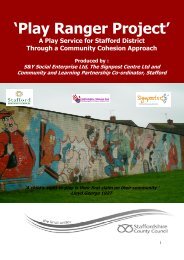


![Bouncy Castles [PDF] - Fair Play For Children](https://img.yumpu.com/45463572/1/184x260/bouncy-castles-pdf-fair-play-for-children.jpg?quality=85)
